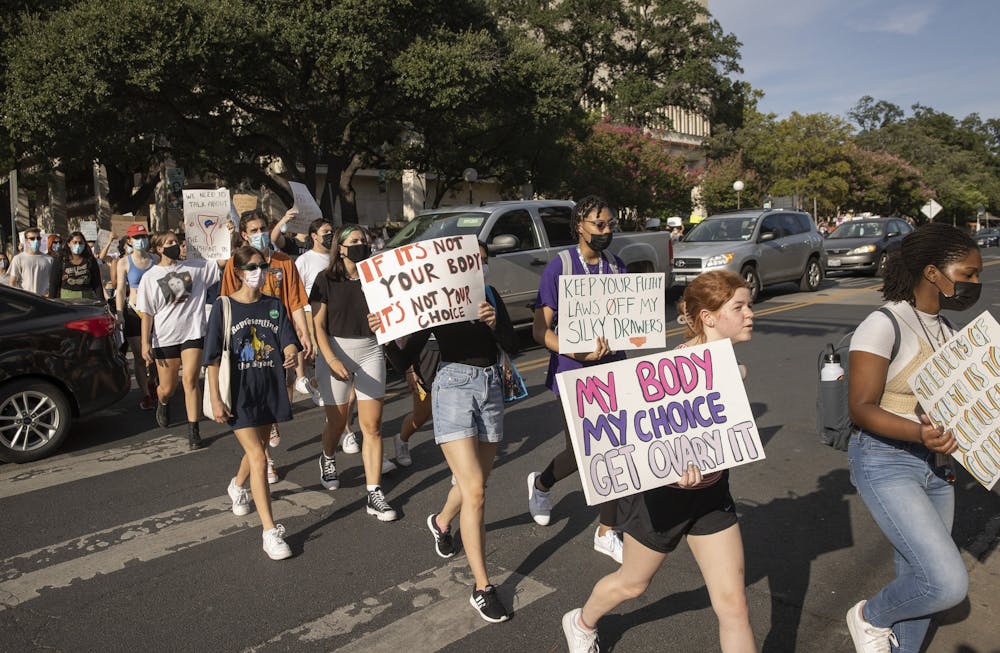“Having to travel, drive across county lines, take a day off of work, find childcare in order to pick up two pills — I mean, that's just a huge barrier for folks all across the state of North Carolina,” Riley said.
One of the most common barriers to care is funding, Justine Orlovsky-Schnitzler, the director of engagement for the Carolina Abortion Fund, said. A Triangle-based organization that serves both the Carolinas, CAF aims to break down these barriers by helping individuals pay for their abortions.
In 2021, CAF made 1,473 pledges to cover an array of procedure-related costs. But, due to a lack of funding, those pledges were made to just over half of those who called about services.
Tara Romano, executive director of Pro-Choice North Carolina, said the conservative N.C. legislature has further threatened abortion accessibility.
Additionally, North Carolina is one of 14 states that have budgeted taxpayer dollars to crisis pregnancy centers. These organizations — many of which are religiously affiliated — seek to dissuade pregnant individuals from having an abortion, along with services such as pregnancy tests and ultrasounds.
“That's public health dollars during a pandemic going to places that, we believe, are just there to promote anti-abortion ideology,” Romano said.
Stigma surrounding abortion
In addition to these physical barriers, the stigma surrounding abortions has magnified their inaccessibility.
“There's just been so much misinformation and disinformation about abortion care,” Romano said.
Over the past two months, anti-abortion protests outside of abortion clinics have become more frequent. Gavin said both patients and staff are consistently harassed outside the A Woman’s Choice clinics in Raleigh and Greensboro.
“Men who are getting Viagra or a vasectomy don't have to experience the same thing,” Gavin said. “It seems crazy that, you know, for a health care decision, that's the way that people are treated.”
Lauren Overman, a full-spectrum doula based in the Triad and a member of the CAF board of directors, has escorted individuals to and from abortion clinics for the past three years.
To get the day's news and headlines in your inbox each morning, sign up for our email newsletters.
“Some patients are just really frustrated by all the barriers that they've already had to encounter, so pulling up to the protesters is like a slap in the face," Overman said.
Overman said she has never had a client change their mind about an abortion because of protesters, but the protesters' loud voices can sometimes lead to patient distress.
Before an abortion procedure, the clinician will take the patient’s blood pressure. If a patient’s blood pressure is too high, they can be sent home, as high blood pressure raises clotting concerns during medical procedures that involve excessive bleeding.
“I have had clients have unpleasant and even scary interactions with protesters that distress them enough that they couldn't get their procedure,” Gavin said. “It's just a really cruel thing to do to somebody.”
'This is what's right'
Though the future of Roe v. Wade is unclear, Orlovsky-Schnitzler said she believes this is an opportunity to strengthen reproductive rights beyond an old Supreme Court decision.
“It has underscored where there were these glaring holes and weaknesses with this piece of history — which, again, is stunningly important,” she said.
She said the right to privacy should not be the cornerstone to abortion care and that there should be more definitive legislation protecting the right to abortion.
“It's definitely just got a lot of folks in the reproductive justice sphere thinking, 'What would it mean to dream bigger?'” Orlovsky-Schnitzler said.
For now, as Roe v. Wade is challenged in the courts, abortion-rights activists plan to continue fighting.
“I know in my soul this is what’s right,” Overman said.
@EmilyySchmidt11
@DTHCityState | city@dailytarheel.com




